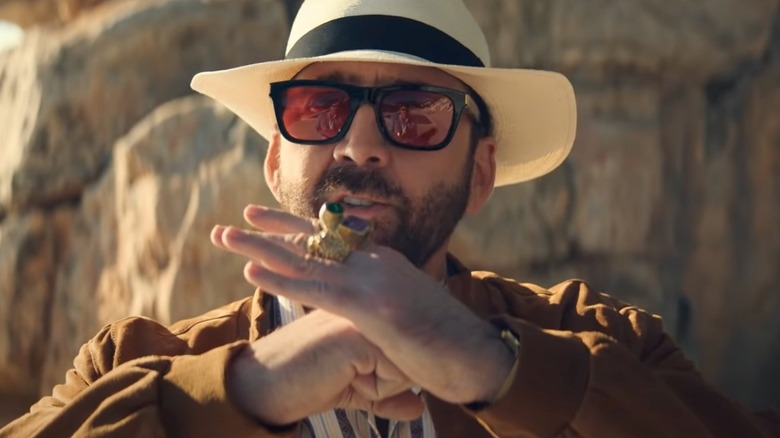
This article contains spoilers for "The Unbearable Weight of Massive Talent."
The emotional hinge of "The Unbearable Weight of Massive Talent" is that it is, literally, a Nicolas Cage movie. Cage, like any member of humanity, searches for meaning. As portrayed in his latest film, he tries to find it in high art. As "The Unbearable Weight of Massive Talent" clearly stipulates, though, Cage and humanity have no say in what leaves a lasting impression.
We can't decide if our loved ones will remember us for our most noble gestures or vulnerable screeds, our proverbial "Leaving Las Vegas" moments, or our silly laughter and the way we took our morning coffee. They might just love the "Guarding Tess" in us, and that's okay. That's the beauty and cost of living, and there's less meaning in legacy than how you arrive at the end of your story.
"The Unbearable Weight of Massive Talent" is a fourth-wall-breaking tribute to the way that legendary actor Nicolas Cage has journeyed through Hollywood and changed humanity's experience of itself. Here are 14 of the best Cage moments from the action-comedy.
What Has It All Meant?
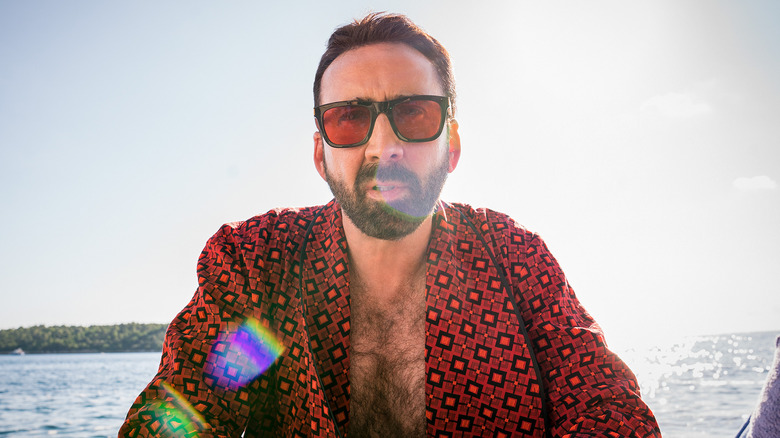
In a March 2022 profile for GQ, Nicolas Cage confronted the memeification of himself: "I still don't really fully understand what the fascination is with my face or facial expressions that happen in these memes," he said. Here's one thing it is: an acknowledgment that Cage is hysterical. He's not a comedian in the traditional sense. The moments when he is a laugh riot are born from thespian instincts and often achieve the feeling of classic clowning by proxy. Yet, they are as funny as any tight five or viral YouTube clip. Audiences don't have the words for why Cage is so amusing, so they turn to a conversation-free world of memes to make sense of this brand of humor.
In some ways, then, "The Unbearable Weight of Massive Talent" reclaims Cage's role as a purposefully comedic force. The scene where he spontaneously attempts suicide is Exhibit A. Having just retired from acting and resorted to appearing at a birthday party to pay off his debts, a drunk Cage listens to the sketchy Lucas (Paco León) ask him if it all meant anything. Cage responds by jumping into the pool and drinking at the bottom of it. It's so shocking and hysterical, that it will likely become a meme. And that's classic Nicolas Cage.
If you or anyone you know is having suicidal thoughts, please call the National Suicide Prevention Lifeline at 1-800-273-TALK (8255).
Ruining His Daughter's Birthday Party
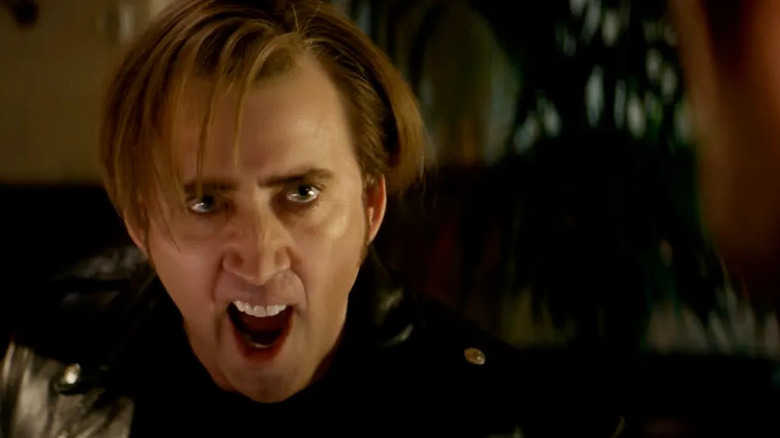
Nicolas Cage demanded on staying unlikable in the movie. To hear the actor tell it to Collider, he discovered that some of the film's comedic set pieces worked better when he was a worse human being within them. That's the ultimate commitment to the acting process over personal gain. There is no character for Cage to hide behind in "The Unbearable Weight of Massive Talent." When he makes his character more unappealing within the movie, he's offering a darker reflection of his own self and persona. That takes the sort of guts that have informed the actor's most memorable acting choices, from "The Rock" to the entirety of Panos Cosmatos' "Mandy."
Cage's obnoxiousness comes to a head in "The Unbearable Weight of Massive Talent" during his daughter's birthday party. The actor interrupts the festivities to wax poetic about a trip he and Addy (Lily Mo Sheen) took to the Grand Canyon, but pivots from paying tribute to his daughter by becoming a train wreck and playing an impromptu piano ballad instead. The song is bad; the performance is drunken and mediocre. It is both horrifying and thrilling to watch in equal measure. Without Cage's willingness to deface his name and appearance during this scene, his redemptive arc doesn't resolve as gorgeously. That commitment makes Nick Cage great, both here and throughout his career.
Offering To Buy A Statue Of Himself For $20,000
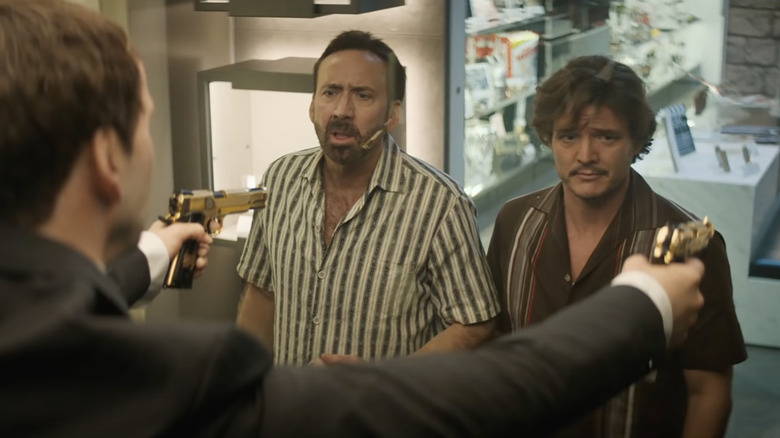
The music stop is a well-worn movie trailer trope. It's the moment when whatever score or song is soundtracking an assemblage of film footage abruptly cuts out to highlight a punchline, visual, or surprise character reveal. There was an excellent music stop in the audience's first look at "The Unbearable Weight of Massive Talent" trailer. As Javi (Pedro Pascal) leads Nicolas Cage through a panic room filled with Nick Cage memorabilia, they arrive at a statue of Cage from John Woo's "Face/Off." It is in the likeness of Castor Troy and bears his two golden guns. "Is that supposed to be me?" Cage whispers. "It's ... grotesque." The music stops before Cage continues: "I'll give you $20,000 for it."
This is an objectively good joke. It's all the better because Cage, in real life, has a history of buying obscure, hideous, and absolutely wild artifacts. At one point, Cage owned a haunted mansion in New Orleans and an actual dinosaur skull. That Cage's character in "The Unbearable Weight Of Massive Talent" would want to buy an overly-expensive statue of himself is a solid wink to the actor's real-life pursuits. That said character is trying to pay off debts when he offers to buy said statue is extremely telling about who this person is. It's a great moment, for both character and the eccentric genius that inspired him.
Doing His Own Stunts
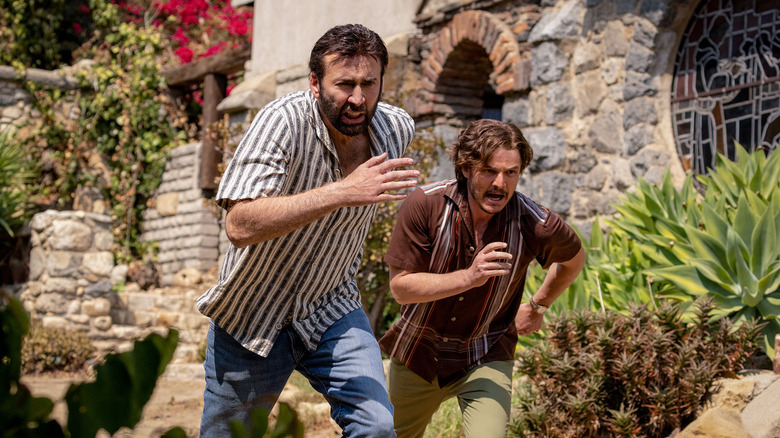
I cannot confirm or deny that Nicolas Cage did his own stunts in "The Unbearable Weight of Massive Talent." That's not important. What's vital to the film is that Cage has, throughout his career, actually put himself in harm's way via stunt work. That fact is a foundation of Javi's passion for Cage. When Javi and Cage trip on LSD and need a hasty getaway, Javi argues Cage should drive because he did his own wheel work in "Gone in 60 Seconds." Later, Cage's participation in the action scenes of "National Treasure" is held against the actor.
It's a minor point but a telling one. Cage is revered for going all in. It's a part of his mystique. Tom Cruise — who has, as of publication, scaled the Burj Khalifa, hung off a plane mid-liftoff, and is plotting to fly into space — doesn't command the same reverence around commitment that Cage does. Though it's hardly instrumental to the movie, Cage doing his own stunts within the film is a moment that feels 100% Nicolas Cage.
Storytelling And Mythmaking
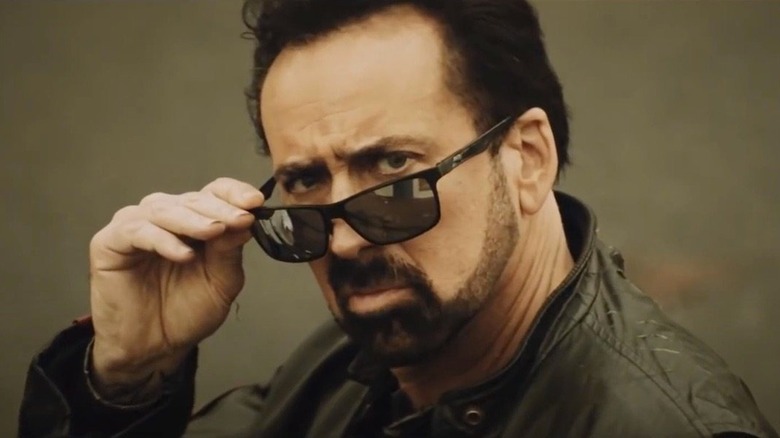
Less than 20 minutes into "The Unbearable Weight of Massive Talent," Nicolas Cage retires from acting. It's as head-spinning a moment as any in his filmography. Imagining Cage without acting (or acting without Cage) is nigh unthinkable. Even when Cage was millions of dollars in debt, performing was the answer. There is no fiber of the 58-year-old's being that doesn't feel calibrated for a life on-screen. So it genuinely raises the stakes of "The Unbearable Weight of Massive Talent" when Cage declares he's done performing, and even more so because of how he does it. While on the phone with his agent (Neil Patrick Harris), Cage crafts a spontaneous press release: "I'm done. I'm quitting acting. Tell the trades it was a tremendous honor to be a part of storytelling and mythmaking."
It's a fun moment, but also a telling one. Cage does traffic more in mythmaking than naturalistic performance. In an interview for CinemaBlend, he described his work as an act of design: "I see in my head the moves, the facial expressions. Whether it be a ridiculous character or all of the way to a sublime moment. From the ridiculous to the sublime. And then, I try to infuse the character with emotional content — genuine, organic emotion and imagination." Cage isn't trying to let the camera capture his inner world; he's building worlds for it.
Whistle Instead Of Speaking
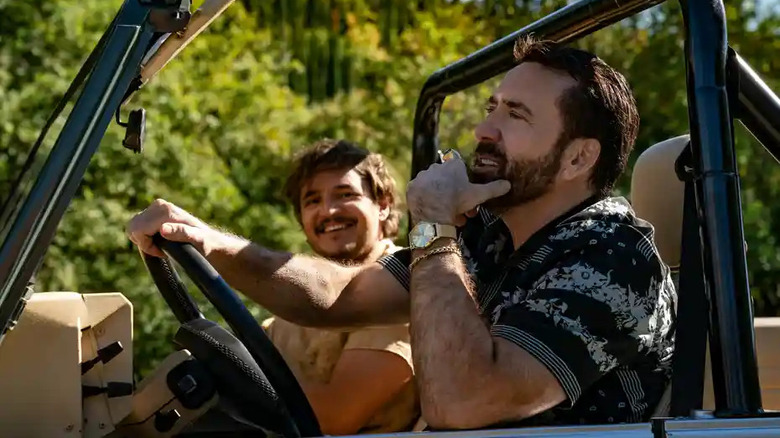
Given how many gloriously profane lines of dialogue Nicolas Cage has spoken throughout his career, one might expect "The Unbearable Weight of Massive Talent" to have a vulgar streak. It doesn't, but don't let that sway you from or inspire you to watch it. Instead, celebrate that one of the film's few lewd moments allows Cage an opportunity to deploy maximum eccentricity.
While being whisked by boat to Javi's private island, Cage hops on the phone with his agent, Richard Fink. To ease Cage's anxiety, Fink tells Cage it's not like Javi is going to encourage Cage to have intercourse with himself, his wife, or someone else's wife. When Cage confronts Javi about this very notion (having no idea that Javi is more than a hired hand) Cage whistles and makes an elaborate hand gesture instead of repeating Fink's dialogue.
The moment is very funny, but it and the film are ecstatic proof that Cage always zigs where others zag, usually by speaking or making noise at a higher pitch than anyone expects. It would feel like a crutch for Cage if its effect on an audience had lost any power, but it hasn't. Old tricks are still fertile ground for Cage.
"Not The Bees!"
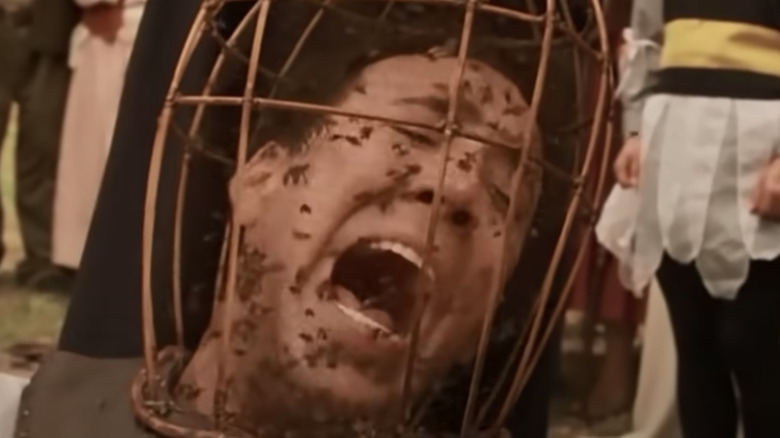
Neil LaBute's 2006 reimagining of the 1973 pagan horror classic "The Wicker Man" is a mostly failed effort. It was a strange marriage of talent and material on paper and even less effective in practice. That said, it contains a scene that transcends good or bad. Nicolas Cage has a brass, well, cage placed upon his head and is then attacked by a swarm of bees released inside of it. He screams, "Not the bees!" and, at this point, describing what happens is a moot point. It's not the action of the bee scene that matters. It's the unexplainable non sequitur of its terrible CGI, manic energy, and infinite rewatchability. Any artist would be lucky to make a moment half as interesting in any medium at any point during their career.
Therefore, it feels essential to both Cage and the movie that the scene gets mentioned near the tail end of "The Unbearable Weight of Massive Talent." Even more crucially, in no way does Tom Gormican's film attempt to replicate the moment. Instead, Cage references the sequence when describing what belt buckle he chose to wear to his movie's premiere. It's a moment that feels as true to Cage's life as any in "The Unbearable Weight of Massive Talent," and the sort that could only occur in a movie about said life.
Committing To The Wall Bit
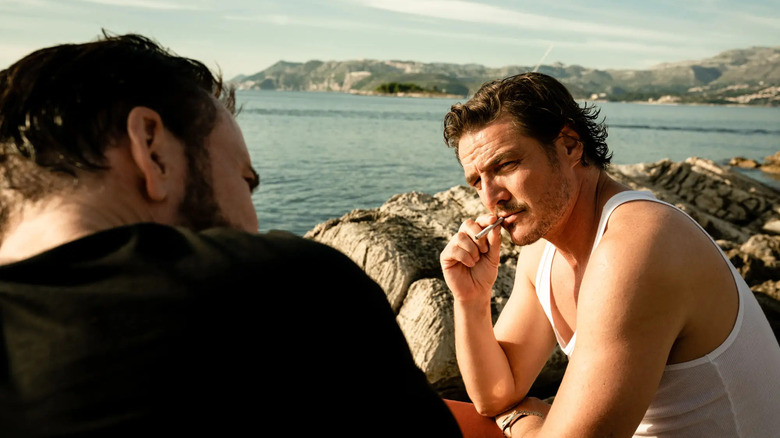
Anyone who's seen "The Unbearable Weight of Massive Talent" might be shocked the driving on LSD sequence didn't make this list. It's omitted for two important reasons: That scene is, crucially, a shared moment between Nicolas Cage and Pedro Pascal's Javi, one which accumulates its power from their shared, life-on-a-knife's-edge energy. Also, it's possible to honor a snippet of that sequence and zero in on why Cage makes it so special.
Near the scene's tail end, Cage and Javi run from two strangers they fear are pursuing them (they aren't). In their attempt to escape, they reach what appears to be a barely scalable wall. Javi gets on his hands and knees to give Cage a boost up, but when Cage reaches down to pull Javi up and over the structure, Javi is unable to reach. Submitting to the doom he's certain is imminent, Javi pleads for Cage to go on without him. Both men live the truth of this absurd and pretend moment fully, but Javi goes in and out of realizing it's an act of imagination.
Cage, by contrast, achieves full-body catharsis during it. He screams. He cries thick tears. He treats the moment like Laurence Olivier treated "Hamlet," giving nothing less than three full acts of a story in under thirty seconds. It's a microcosm of what has made Cage so appealing over his 40-plus years as a performer.
Making The Difficult Choice
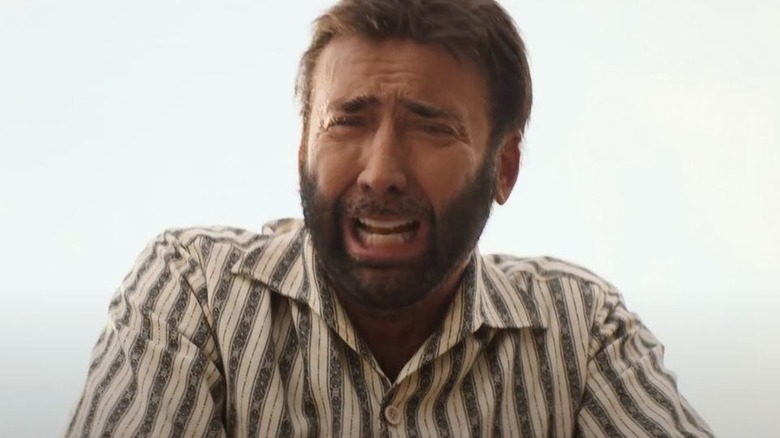
This one's a little hard to explain. "The Unbearable Weight of Massive Talent" ends with Nicolas Cage letting go. He relinquishes control of movie night to his daughter, letting her pick what the family watches for once. The film she chooses is "Paddington 2," a cinematic masterwork that is breezier than the films Cage espouses passion for ("The Cabinet of Dr. Caligari," for one). "Paddington 2" is an easy film to sit through; in no way does that diminish its value. Sometimes "easy" can be a gift.
Throughout "The Unbearable Weight of Massive Talent," we see Cage do the opposite of easy. He takes almost every opportunity to make his life more difficult. He puts himself through the pain of forced retirement. He opts to join the CIA. He struggles with obstacles that literally aren't obstacles or aren't even there. And it feels, to be blunt, very Cage of him to do so. His performances don't look easy — that's half their charm. They are labors of love and craft, but they are definitely labors. Cage makes a Herculean effort look smooth and kinetic, but he always pushes harder and farther than his contemporaries.
Watching a fictional Cage take on more than he should feels like a bizarre and roundabout tribute to his core appeal. That the film's story works because of this extra effort seems like proof that it is.
Crying During Paddington 2
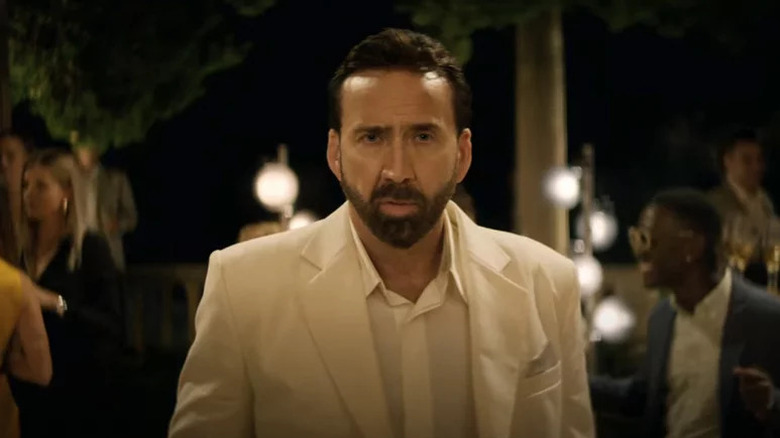
Nicolas Cage is a noted film enthusiast. In an interview with CinemaBlend, he even proposed swapping the word "fandom" for "film enthusiast." Cage understands (and often embodies) the heart of someone whose life changed through cinema. It's a quality he didn't even have to act in "The Unbearable Weight of Massive Talent," going so far to refer to his and Pedro Pascal's film discourse as a "no acting" approach: "We're both film enthusiasts, we would share ideas about movies and we would talk together about movies. And so, it was kind of like, 'No acting, please.' We'd be off-camera talking about movies, and we'd be on-camera talking about movies. It was just very easy."
That means that the scene in which Cage and Javi watch "Paddington 2" is actually very much the actors themselves. More importantly, it proves essential to the film. It's the scene in which the film tastes of Nick Cage the character become more like those of Nicolas Cage the performer. Consequently, the experience of watching "Paddington 2" brings Cage closer to his shrunken supply of empathy (a fact confirmed by the movie's final, touching moments).
Film enthusiasm forms the basis for radical change in "The Unbearable Weight of Massive Talent," and that belief has inspired the Cage performances and films that have transformed the lives of so many. Ergo, crying during "Paddington 2" is an extremely Cage moment.
Knocking Himself Out With A Gesture
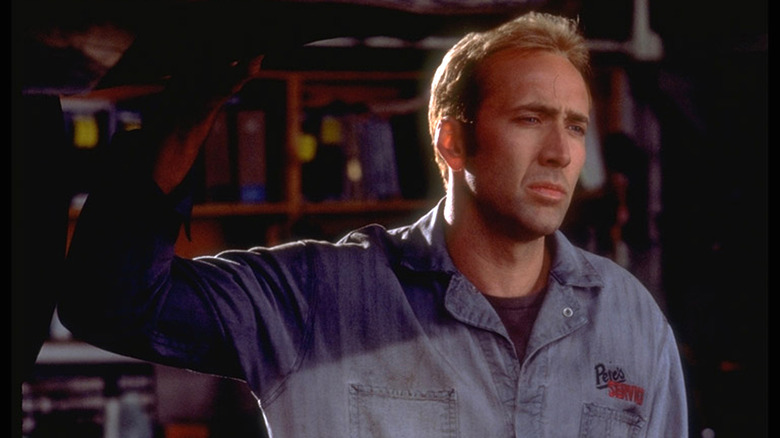
Of all the formative experiences I've ever had in a movie theater, 2000's "Gone in 60 Seconds" is higher up on the list than I'd readily admit. Dominic Sena's souped-up car-heist thriller exudes a very specific, tail end of the 1990s kind of cool. It has an overqualified cast, and it commits one of Nicolas Cage's most improbable acting gestures to celluloid.
During the film's second act, Cage pauses his crew's mobilizing to lift both of his hands towards his face, fingers in the Hook 'em Horns position, then shakes those hands three times and growls, "Okay, let's ride." This decision makes all the sense in the world and no sense at all — it's the greatest.
Considering his use of gestures, it's fitting that in "The Unbearable Weight of Massive Talent," Cage knocks himself out with an improbable hand motion. During a mid-film espionage sequence, Cage applies a substance to his hand that will knock an incoming guard unconscious. He gets into position, and then, for no reason at all, he rubs the substance on his forehead. It's a stunning opportunity to watch a relented physical performer relinquish control of their body in the service of comedy and, for Cage, it all starts with one of his iconic gestures.
Becoming An Italian Crime Boss
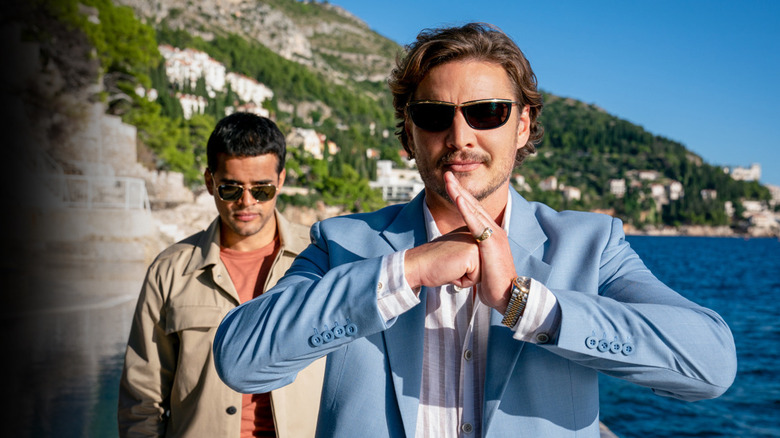
Robert Frost's poem "A Servant to Servants" carries the sentiment that "the best way out is always through." That said, it's difficult to imagine that Frost could have ever guessed how it would apply to a story like "The Unbearable Weight of Massive Talent." For Nicolas Cage — actor, legend, and inadvertent CIA agent — the only way out is through being Nicolas Cage.
To rescue his daughter, Cage, Javi, and Cage's wife, Olivia (Sharon Horgan), must infiltrate Lucas Gutierrez's heavily armed compound. The plan they concoct? Dress Cage up as a crime boss no one has seen for 15 years, a man who has recently done business with Lucas. Cage is promptly buried under a flood of elaborate prosthetics, dressed in an insanely garish tracksuit, and sent into the compound wielding an ungainly Italian accent.
The performance is both a parody of and tribute to Cage's most extreme choices, but the fact that it works as a story beat makes it one of the film's most Cage-worthy gestures. When "Ocean's Twelve" needed Julia Roberts to play at being Julia Roberts, it let her play it straight and made the world of the film in awe of her. When Cage needs to play at being Cage, he alters the tone of the film entirely.
"I'm Nicolas F***ing Cage, Whoo!"
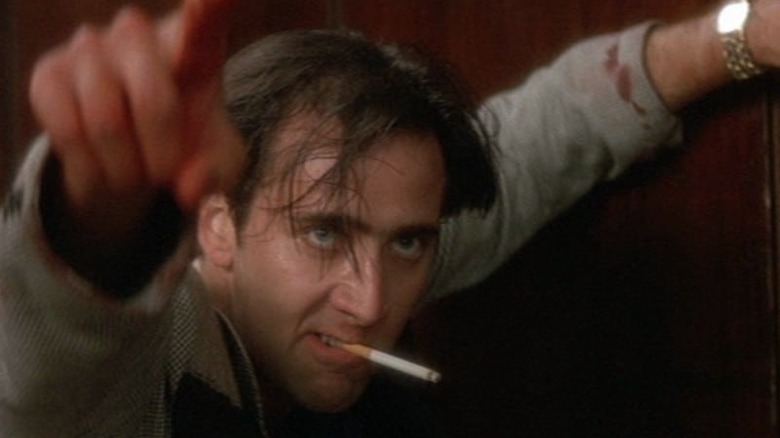
"The Unbearable Weight of Massive Talent" can't help itself, which is understandable given its subject. Nicolas Cage has made a career of making art in which excess is the norm. If the film's story occasionally feels a little extra, it's because that story is set in a ballpark where the walls are drenched in neon and also on fire. So when Nick Cage, the CGI de-aged version of Nicolas Cage, confronts Cage in a bar and asks him who he is, it's both ridiculous and fitting that he screams, "I'm Nicolas f***ing Cage, whoo!" before the actor can even answer. The phrase lasts what feels like a minute but is maybe 15 long seconds, each of them drenched in ridiculousness. It's silly, brilliant, and almost grinds the movie to a halt.
It is impossible to imagine any other entertainer pronouncing their own name in such a garish and form-breaking way. When Cage does it here, it's both a great joke and a reflection of self. Cage once behaved in such a way that "Nicolas f***ing Cage" might as well have been on his birth certificate (think the "Wild at Heart" days). That's no longer the case. Cage's return to his younger ways is proof of how far he's come, and the insane scream which beckons this confrontation is as brave a choice as the actor's ever made.
Kissing Himself
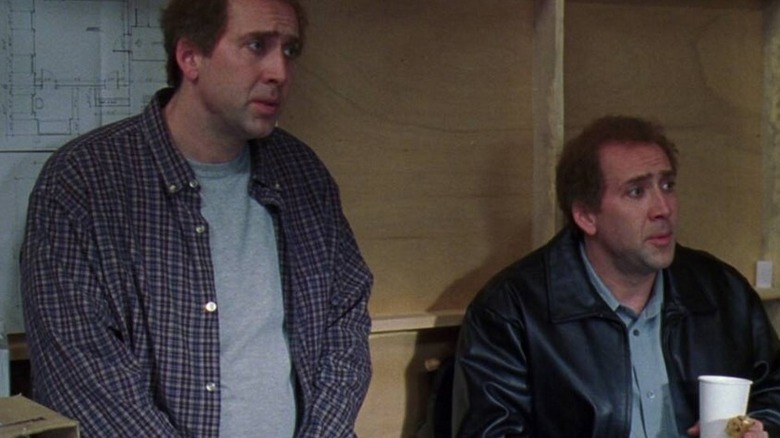
Nicolas Cage making out with himself might be the ultimate Nicolas Cage moment in "The Unbearable Weight of Massive Talent." For one, it's a moment Cage concocted. The script called for the actor's projected younger self to kiss Cage proper on the cheek. Cage took it one step further. Speaking to IndieWire, director Tom Gormican admitted that he "wouldn't even have thought to suggest it, but it's exactly the sort of Nicolas Cage choice that led us to write this movie." That choice is followed by the equally bizarre and wonderful line, "You tell 'em Nick Cage smooches good!"
Silly? Absolutely, yes. Still, you could argue no moment in Cage's entire career has better encapsulated the actor's conversation with his own artistry, his indelible contribution to the acts of "storytelling and mythmaking." Some performers would stop at the cheek kiss. That's not Cage, though. That's not why audiences came out to see a self-referential and existential dread-filled comedy about him on opening weekend. Nicolas Cage smooches real good — somehow, he makes that art.
Read this next: 20 Underrated Comedy Movies You Need To Watch
The post The 14 Best Nicolas Cage Moments In The Unbearable Weight Of Massive Talent appeared first on /Film.
0 Comments